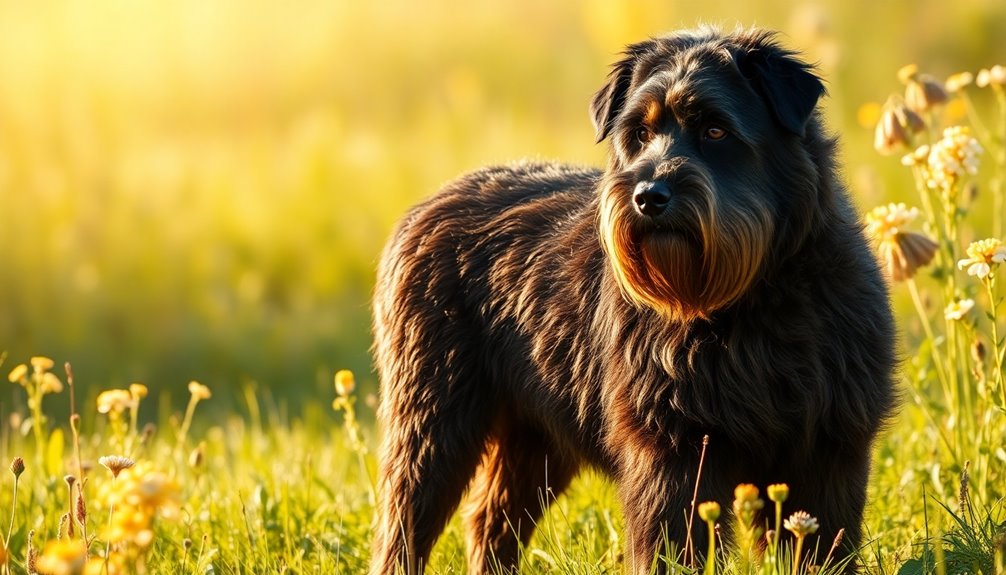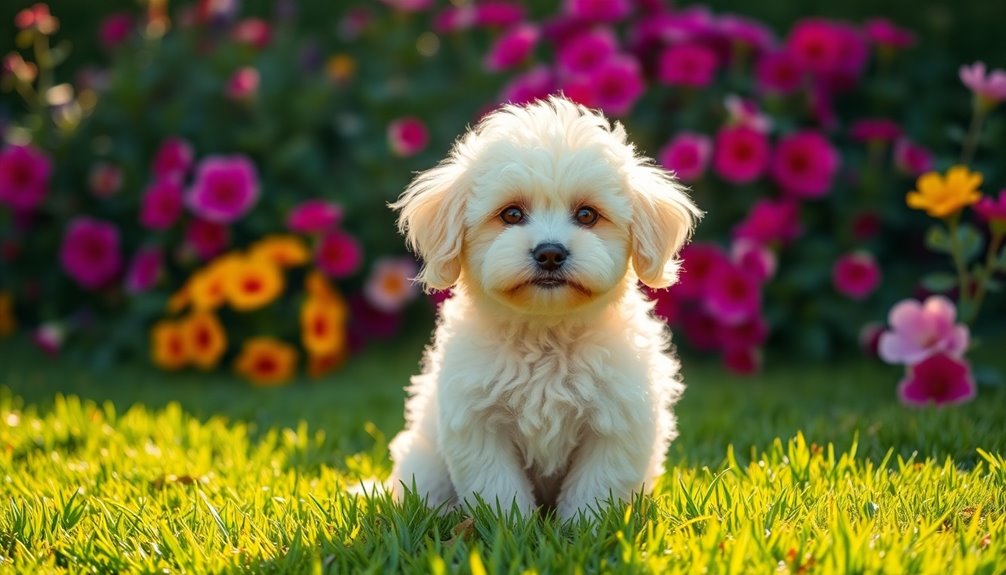The Bouvier Des Flandres is truly a gentle protector, combining strength with a calm demeanor. Originating from Belgium and France, these dogs were bred for herding and guarding livestock. Standing between 23.5 to 27.5 inches tall, they have a distinctive rugged look, complete with a bushy beard and bushy eyebrows. Their protective instincts make them excellent guardians of your home and family. With a patient nature, they're great with kids, though supervision is vital due to their size. Regular exercise and training help them thrive. Keep exploring, and you'll discover more about their care and compatibility with family life.
Key Takeaways
- The Bouvier des Flandres is known for its protective instincts, making it an exceptional guardian for families and properties.
- With a gentle demeanor, this breed is highly trainable and forms deep bonds with family members, including children.
- Their unique appearance features a rugged coat, characterized by a heavy beard and bushy eyebrows, contributing to their distinctive look.
- Regular exercise of 1.5 to 2 hours daily is essential for their physical and mental well-being, promoting a balanced temperament.
- Early socialization and consistent training help ensure positive interactions and prevent aggressive behaviors towards other pets.
Introduction
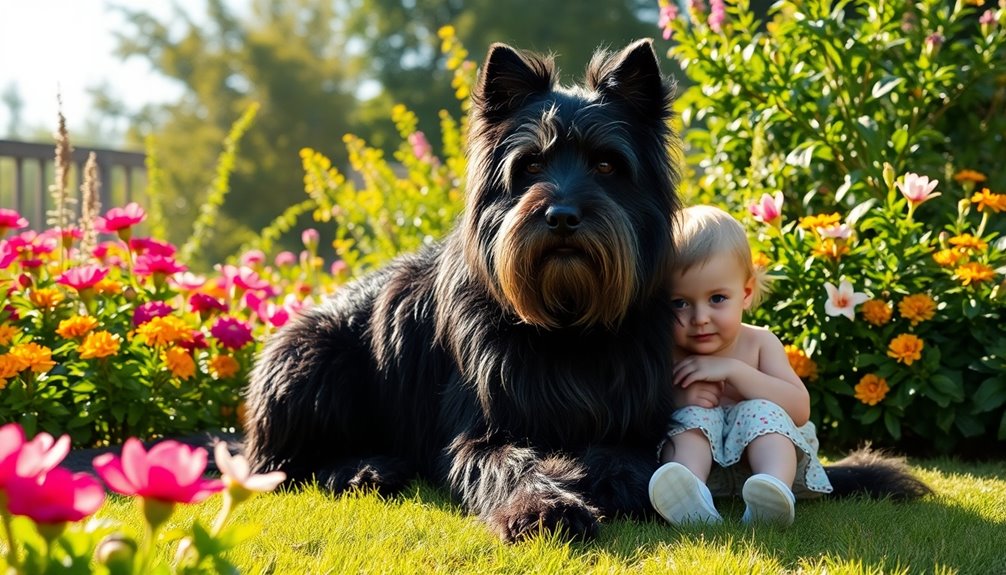
The Bouvier Des Flandres, known for its gentle demeanor and protective instincts, is a remarkable breed that combines strength with affection.
Standing between 24.5-27.5 inches tall for males and 23.5-26.5 inches for females, these dogs typically weigh between 70-110 pounds. Their double coat, which is rough and medium-length, comes in a variety of colors, including black, brindle, and fawn. While they shed moderately, regular grooming—weekly brushing and trimming every 3-5 weeks for show—keeps their coat in top shape. These dogs are also known for their high energy; they require mental and physical stimulation to stay happy and healthy.
Affectionate and loyal, Bouviers are especially patient with young children, making them ideal family pets. However, they need early socialization to prevent shyness.
With high energy levels, they require at least two hours of exercise daily, and their eagerness to please makes them easy to train, as long as training remains engaging.
These dogs thrive in family environments where they can bond and spend time outdoors. While typically reserved around strangers, proper socialization helps them feel more comfortable.
If you're considering adding a Bouvier Des Flandres to your home, prepare for a loyal protector who'll bring both strength and warmth into your life.
History and Origin
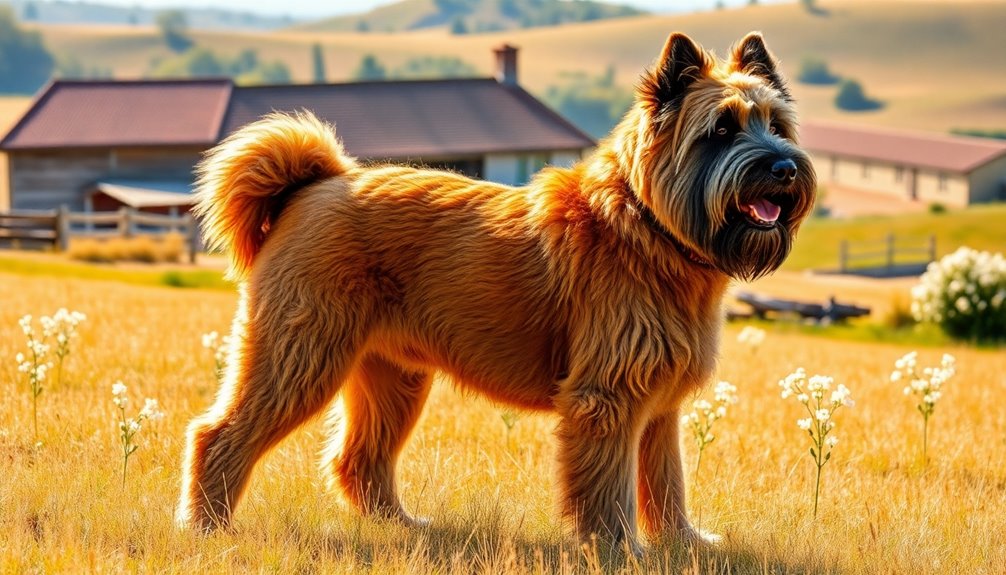
The Bouvier Des Flandres originated in Flanders, Belgium, and France during the late 19th century, evolving from local herding dogs. These dogs were bred to excel as farm and livestock guardians, performing tasks like herding, pulling carts, and protecting property. Over time, their robust nature and intelligence made them invaluable on farms, shaping their role in agricultural life. Their lineage includes mating with Berger Picard and Matin breeds, contributing to the development of the modern Bouvier.
Where and when the breed originated
Where did the Bouvier des Flandres come from? This remarkable breed originated in the Flanders region, which encompasses parts of Belgium, France, and the Netherlands. Specifically, its roots lie in the northern regions of France and Belgium, steeped in medieval history.
While these dogs date back to medieval times, they were formalized as a distinct breed by the late 19th century. By the end of the 19th century, breeders were developing the Bouvier des Flandres, with significant progress occurring in Belgium during the early 1900s.
Veterinary surgeons visiting local farms recognized the breed, leading to its formal establishment around the early 20th century. The Bouvier des Flandres was bred from a mix of Irish wolfhounds, Scottish deerhounds, and local farm dogs, tracing its lineage to breeds like the Griffon, Beauceron, and Sheepdog.
Key figures in early breed development included Messieurs Moermans and Paret, with a breed standard established by the Club National Belge du Bouvier des Flandres in 1922. This breed made its first appearance at an International Show in Brussels in 1910, paving the way for its recognition and spread across Europe and beyond. Additionally, the Bouvier des Flandres is known for its loyal and protective nature, making it a valued companion for families.
Farm and Livestock Guardian
Bouvier des Flandres were invaluable farm workers, taking on numerous roles that showcased their versatility and strength. Originally bred for tasks like cattle droving and sheep herding, these dogs were essential on farms. Their role in agricultural systems is reminiscent of the way the Hopi Tribe has historically engaged with their land and livestock.
You'd find them pulling carts to transport products to market, assisting in butter churning, and guarding the livestock. Their natural instincts made them excellent livestock guardians; they worked tirelessly to ensure the safety of cattle and other farm animals.
With a strong build and protective temperament, Bouvier des Flandres excelled in their guardian roles. Their intelligence and gentle nature allowed them to bond with livestock while remaining vigilant. Not only did they protect, but they also herded cattle, showcasing their remarkable aptitude. Their adaptability extends beyond the farm, making them suitable for various roles, including search and rescue.
This breed's thick, weather-resistant coat and distinctive long beard made them well-equipped for outdoor tasks.
Despite facing extinction during the world wars, dedicated breeders revived the breed, ensuring their survival.
Today, Bouvier des Flandres continue to embody the qualities that make them exceptional farm and livestock guardians, combining a strong work ethic with unwavering loyalty and protectiveness.
Physical Characteristics
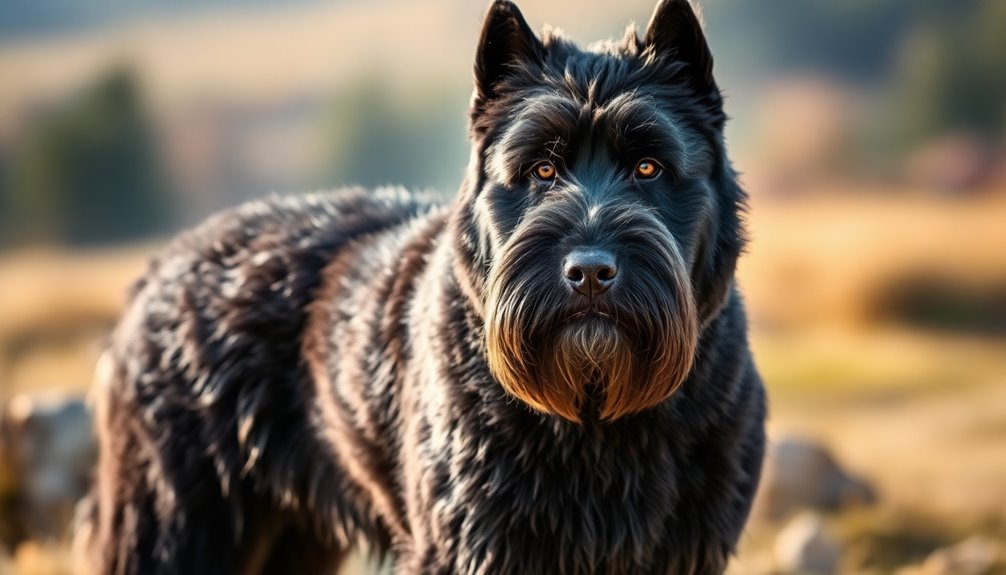
When you look at a Bouvier Des Flandres, their size and build immediately catch your eye.
Males typically stand between 24.5 to 27.5 inches tall, while females are slightly smaller, and their robust, muscular form is complemented by a distinctive double coat.
With their unique beard and bushy eyebrows, these dogs not only radiate strength but also possess a rugged charm. Their lifespan typically ranges from 10-12 years(10-12 years), which adds to their appeal as long-term companions.
Size, weight, and coat details
The impressive physical characteristics of the Bouvier des Flandres make it a remarkable breed. Males stand between 24.5 and 27.5 inches tall, while females reach heights of 23.5 to 26.5 inches, with males generally being taller. Most of their height is achieved by age one.
In terms of weight, males typically weigh between 70 and 110 pounds, whereas females range from 60 to 100 pounds. Rapid weight gain occurs during the first six months, continuing up to two years of age. Additionally, the breed's average life expectancy is around 10 to 12 years, which emphasizes the importance of maintaining their health throughout their life.
Their coat consists of a double layer: a rough, tousled outer coat and a fine, dense undercoat that offers weather resistance. This coat not only protects them during hard work and harsh weather but also requires regular grooming.
You'll need to brush them several times a week to prevent matting, and trimming is necessary every 4-6 weeks to maintain their appearance. During spring and fall, expect more grooming due to shedding. Baths can be given as needed, using specific shampoos for different skin conditions.
Additionally, regular cleaning of their ears and eyes helps prevent health issues.
Beard and Bushy Eyebrows
One of the most striking features of the Bouvier des Flandres is its characteristic beard, which instantly captures attention. This heavy and rough beard contributes to the breed's gruff expression, making it easily recognizable. The longer hair on the chin forms a distinct beard, while the Dutch nickname "vuilbaard," meaning "dirty beard," emphasizes its rugged charm.
Accompanying the beard is a heavy, rough mustache that enhances the dog's distinctive look. The longer hair on the upper lip creates a hallmark mustache, adding to the overall rugged appearance. Both the beard and mustache are vital components of the breed's double coat, featuring coarse hairs that reinforce its tough demeanor. This coat is not only weather-resistant but also requires regular grooming to prevent matting, which is essential for the breed's general health.
Bushy eyebrows made up of erect hairs further define the Bouvier's face. These eyebrows accentuate the shape of the eyes without concealing them, and they make the stop—where the muzzle meets the forehead—more pronounced.
Together, the beard, mustache, and bushy eyebrows create a bold, alert expression that captures the essence of the Bouvier des Flandres. The well-proportioned facial features contribute significantly to its identity as a gentle protector.
Temperament and Personality
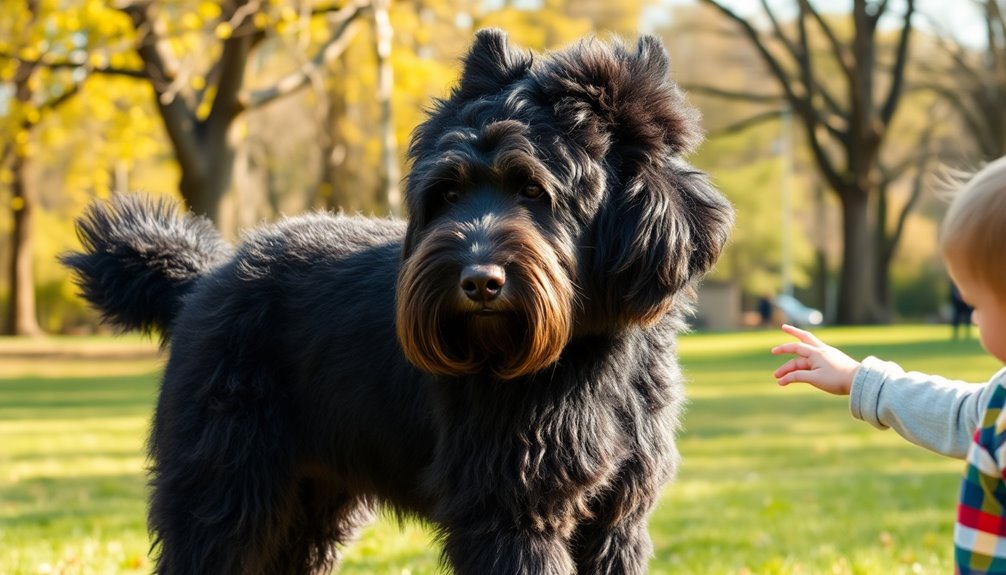
When you think about the Bouvier Des Flandres, you'll notice their protective and watchful demeanor, making them excellent guardians for your family. They're not just gentle giants; their affectionate nature and adaptability make them great companions for both families and individuals. However, if you have other pets, it's essential to consider their strong prey drive before bringing one into your home. To keep them happy and prevent destructive behavior, they require at least 2 hours of exercise daily to thrive.
Protective and Watchful Demeanor
Protection and vigilance define the Bouvier des Flandres, making them exceptional guardians in both home and work environments. With a strong protective instinct rooted in their herding and guarding origins, these dogs naturally focus on safeguarding their family rather than punishing perceived threats.
You'll notice their body language—like body-blocking and heading off intruders—demonstrates their commitment to control and protect without excessive aggression. Their watchful nature ensures they're always alert, announcing the approach of strangers with a calm yet bold demeanor. While they won't bite unless provoked, their confidence and self-assuredness give you peace of mind. You can trust them to anticipate movements and manage situations effectively, remaining composed even under pressure.
Additionally, the Bouvier is highly trainable, responding well to positive reinforcement. They look to you for cues, showing sensitivity to your feelings and the environment. Their adaptability in various roles, including military and police work, showcases their versatility beyond just being family protectors.
Their balanced temperament allows them to form deep bonds while maintaining an independent thought process. This combination of protective instincts and respect for others makes them a reliable presence, ready to defend without unnecessary aggression, ensuring safety in various social situations.
Suitability for families, individuals, or other pets
The Bouvier des Flandres is a versatile companion, making them suitable for families, individuals, and even other pets. They get along well with people of all ages, especially children, thanks to their patient and eager-to-please nature. However, supervision is recommended around young kids due to their size and strength. Regular veterinary check-ups are important for maintaining their health and ensuring a longer lifespan, as they can live up to 14 years with proper care. Additionally, engaging them with educational toys can enhance their mental stimulation and overall well-being.
Active families will find them ideal, as they thrive on outdoor activities and require at least two hours of exercise daily.
For individuals, Bouviers need a strong leader who can provide regular training and socialization. They enjoy being involved in their owner's activities and can adapt well to various lifestyles, but they may struggle with being left alone for extended periods.
When it comes to other pets, Bouvier puppies adapt well to older dogs or cats with proper introductions. However, older Bouviers might find it challenging to integrate into homes with existing pets. Early socialization is crucial for fostering positive relationships.
Health and Lifespan

When it comes to the Bouvier Des Flandres, you can expect a lifespan of around 10 to 12 years, though some may live longer with proper care. This breed generally enjoys good health, but being aware of common issues like hip problems or gastric dilatation is crucial. Regular veterinary visits are essential for monitoring their health status and catching any potential health issues early on. Additionally, incorporating long-term financial planning for their care can help ensure that you are prepared for any unexpected health-related expenses.
Typical lifespan of the breed
Bouvier des Flandres typically enjoy a lifespan ranging from 10 to 15 years, a testament to their robust health and vitality. This longevity is influenced by various factors, including genetics, diet, and overall healthcare. By prioritizing their well-being, you can help your furry friend live a healthier and more fulfilling life.
Genetics plays a significant role in determining how long your Bouvier may live, but you can positively impact it through proper care. A balanced, high-quality diet formulated for large-breed puppies supports healthy growth and ongoing vitality. Regular veterinary check-ups are crucial, as they can catch potential issues early and extend your dog's lifespan. Additionally, maintaining a suitable living environment that allows for regular physical exercise is vital to their overall health.
Preventive health measures, including dental care, are essential for avoiding early health problems. Additionally, providing regular physical exercise and mental stimulation through activities like obedience and agility training keeps your Bouvier happy and healthy.
Creating a suitable living environment, such as a farm or country setting, can also enhance their quality of life. With responsible ownership and attentive care, you can ensure that your Bouvier des Flandres enjoys a long, vibrant life by your side.
Common health concerns or genetic predispositions
Often, Bouvier des Flandres face specific health concerns and genetic predispositions that owners should be aware of. One significant issue is Bouvier des Flandres Myopathy, a muscle disease that can stabilize with early intervention.
Additionally, laryngeal paralysis is a hereditary condition that affects breathing and voice. Hip and elbow dysplasia are common orthopedic issues in large breeds like Bouviers, which can lead to mobility challenges. It is also important to note that the breed's gentle disposition contributes to their suitability as family pets, despite their health challenges.
You should also be vigilant about degenerative myelopathy, a progressive spinal disease, and progressive rod-cone degeneration, an inherited eye disorder that may cause blindness. Regular veterinary check-ups are crucial for early detection.
Viral infections like parvo, rabies, and distemper can be prevented with vaccinations, while dental disease often results in chronic issues if left untreated.
Gastric dilatation and volvulus (GDV) is a life-threatening condition requiring immediate attention, and heartworms necessitate periodic testing for dogs over seven months old.
Lastly, keep an eye out for skin and ear infections, which often relate to hypothyroidism, as well as other conditions like cataracts and glaucoma. Being proactive about these issues can help ensure a healthier life for your Bouvier.
Tips for maintaining health and wellness
To ensure your Bouvier des Flandres lives a long and healthy life, it's essential to focus on a comprehensive approach to their health and wellness.
Regular veterinary care is crucial; schedule annual check-ups and vaccinations to detect any potential issues early. Always follow your vet's advice for maintaining your dog's health.
A balanced diet plays a significant role in their wellbeing. Provide high-quality dog food appropriate for your Bouvier's life stage, and maintain a healthy weight to prevent obesity-related problems. This breed may be prone to certain health issues such as hip/elbow dysplasia, so monitoring their weight is particularly important. Feeding them vet-approved brands can help ensure they receive optimal nutrition.
Avoid overfeeding to reduce the risk of bloat.
Your Bouvier needs plenty of exercise. Daily walks and regular playtime are essential for their physical and mental health.
If possible, let them run in a spacious area, but avoid vigorous exercise right after meals.
Grooming is also vital. Brush your Bouvier's double coat once or twice a week to prevent matting and keep it clean.
Regularly check their ears for infections, and don't forget routine nail trimming and dental care.
Care Requirements
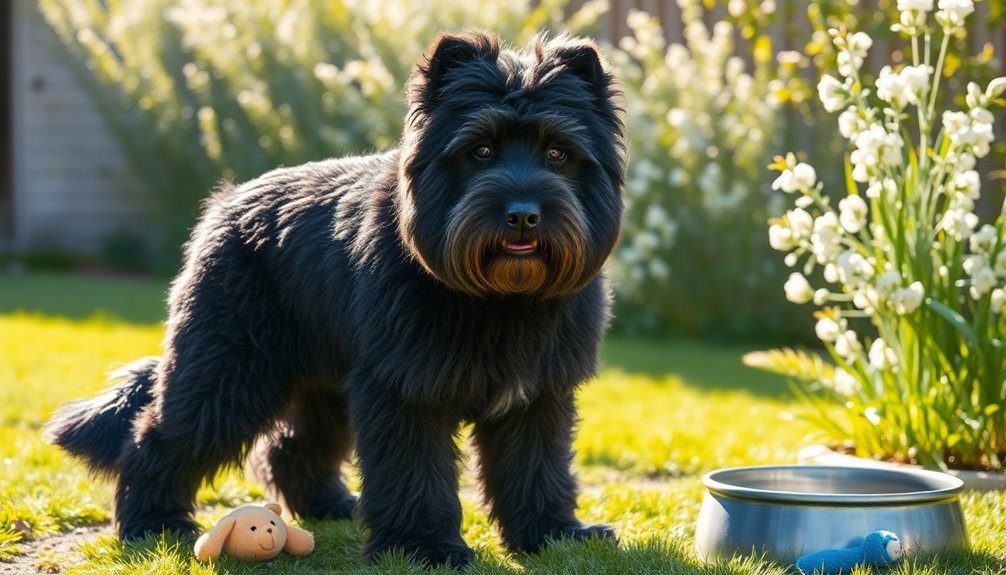
Caring for your Bouvier Des Flandres involves regular brushing to keep their coat healthy and prevent matting. In addition, their coat maintenance is surprisingly low maintenance, as it is designed to appear natural and rugged. You'll also need to ensure they get plenty of exercise—at least two hours a day—to match their energy levels. A balanced diet with high-quality protein and proper feeding tips will support their overall well-being.
Regular Brushing Required
Regular brushing is essential for maintaining the Bouvier Des Flandres' coat, and you should aim to brush several times a week. This routine helps prevent matting and removes loose hair, keeping your dog's coat healthy and manageable. Use a slicker brush and a comb for the best results. Line brushing followed by combing down to the skin effectively tackles tangles and reduces shedding.
In addition to regular brushing, you'll need to trim around the ears, paws, and sanitary areas. The beard also requires weekly cleaning to avoid tangles. Make sure to clean the ears every two to three weeks and trim nails every three to four weeks. Bathing should only happen when the coat is dirty, and ensure you dry the coat thoroughly afterward. Bouvier Des Flandres require routine grooming to maintain their thick, shaggy coat and prevent skin issues.
If you skip brushing, your dog may develop mats, which can become 'baked in' if you bathe them without first removing knots. Regular grooming not only keeps the coat looking good but also prevents skin issues.
To help with mat prevention, consider using hair serum on the beard. For uncooperative dogs, a grooming noose can be a useful tool to keep them steady during grooming sessions.
Exercise requirements and energy levels
Bouvier Des Flandres thrive on consistent exercise and mental stimulation to keep their energy levels in check. You'll need to provide at least 1.5 to 2 hours of exercise per day, which can include long walks, jogging, or interactive games like fetch. Engaging in dog sports such as agility, obedience, or herding is also beneficial for their well-being. Additionally, regular vet check-ups are recommended due to their predisposition to specific health issues, including hip dysplasia.
Don't forget to incorporate mental challenges like puzzle toys and training sessions to keep them sharp.
For puppies, focus on short, controlled play sessions lasting about 15-20 minutes, several times a day. Avoid overexerting their growing bodies and gradually increase exercise intensity as they mature. Around 12 to 18 months, they can handle adult-level exercise.
If you live in an apartment, be prepared for significant daily exercise and mental stimulation. A large fenced backyard or farm setting is ideal, as lack of exercise can lead to boredom and behavioral issues.
Lastly, monitor their food intake to prevent obesity, and consult with your vet to tailor exercise to your Bouvier's individual health needs. Consistent exercise ensures your gentle protector stays happy and healthy.
Feeding tips and diet recommendations
Feeding your Bouvier Des Flandres a balanced diet is essential for their overall health and vitality. Focus on high-quality protein from animal sources like beef, chicken, and fish. This helps support their muscular build and energy needs. Raw feeding can provide species-appropriate nutrition that aligns with their natural dietary requirements, promoting optimal health.
Include essential fatty acids, particularly Omega-3s, to boost their health and energy levels. Limit carbohydrates to small amounts of vegetables, herbs, and berries for fiber and antioxidants. Fresh food diets using human-grade ingredients can reduce inflammation and maintain weight.
Avoid highly processed kibble, as it may lead to dental disease and other health issues. Feed your Bouvier in two meals a day to prevent obesity and bloat. Monitor their food intake closely, and use elevated bowls to reduce strain on their neck and digestive system.
Limit treats to maintain a healthy weight. Always ensure fresh water is available at each meal. Be mindful of any food allergies or sensitivities, opting for high-quality, large breed dog food as recommended by your vet.
Following these feeding tips will help keep your Bouvier in prime condition, reducing the risk of joint issues and promoting dental health.
Training and Socialization
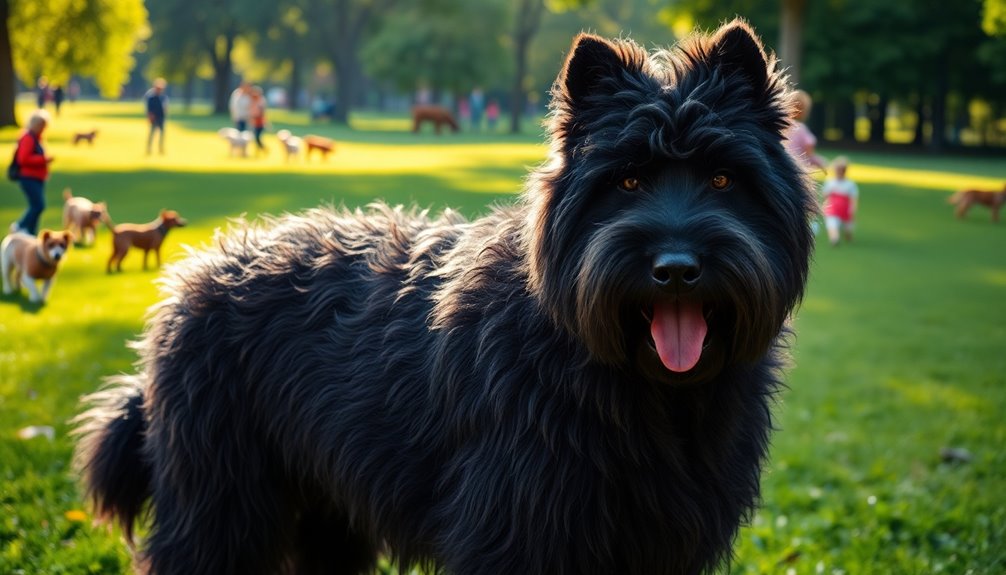
Training a Bouvier des Flandres requires consistency and patience, as their moderate intelligence means they'll respond best to structured sessions. Gradual introductions to new environments help them adapt and reduce any leash reactivity towards strangers. Establishing a regular routine for feeding and bathroom breaks can further enhance their training experience.
Moderate Intelligence, Requires Consistency
For anyone considering a Bouvier des Flandres, understanding their moderate intelligence and training needs is crucial. These dogs are bright and eager to please, which generally makes training an enjoyable experience.
Start training early with house training and basic commands like sit, stay, come, heel, and down. Remember, consistency is key due to their independent streak and occasional stubbornness. Establish a routine for feeding and bathroom breaks to aid in house training and overall behavior. Their strong instincts developed from herding functions can also guide you in training, as they naturally want to protect their family and environment.
Use a rewards-based approach—treats, praise, and play—during training sessions. Keep these sessions short and fun to maintain their interest and motivation. Consistency in rewards and discipline will help your Bouvier understand what's expected of them, which is essential for preventing destructive behavior.
Incorporate socialization alongside training. Enroll your Bouvier in puppy classes to foster well-roundedness. The more exposure they've to different environments, people, and animals, the better equipped they'll be to handle new situations.
Gradual Introductions to New Environments
Gradual introductions to new environments are essential for Bouvier des Flandres puppies, as they help shape their comfort levels and confidence. Start early with socialization, consistently exposing your puppy to various people, young children, and other dogs. This practice not only helps them stay calm during visits but also prevents undue aggressiveness, ensuring they grow into well-adjusted adults.
When introducing your Bouvier to other animals, it's crucial to do so in a controlled manner. Since they may have herding instincts that could lead them to chase smaller pets, early socialization will help them learn to coexist peacefully. Reinforce positive behavior during these introductions with treats and praise, and always monitor their interactions closely. Additionally, understanding their territorial nature can help you manage introductions more effectively.
Adaptation to new living environments, whether it's an apartment or a house, also plays a vital role. Bouviers need daily exercise and mental stimulation, so engage them in activities like long walks, play sessions, or dog sports. Regular outings to parks or open spaces will help them burn off energy and maintain their contentment. By taking these steps, you'll set your Bouvier up for a happier, more balanced life.
Leash Reactivity Towards Strangers
As you continue to socialize your Bouvier des Flandres, it's important to address leash reactivity, especially towards strangers. Leash reactivity often stems from emotional arousal, leading to behaviors like barking or lunging. Remember, this isn't necessarily aggression; your dog may just be excited or frustrated by the barrier of the leash.
Understanding your dog's intent is crucial. Are they trying to approach or stay away from the stranger? It's important to recognize that leashes act as barriers, which can increase your dog's stress levels when encountering unfamiliar people.
To manage this behavior, start with rewards-based training. Keep sessions short and fun to maintain your dog's interest. Teach basic commands like "sit," "stay," and "heel" to help manage their reactions.
When approaching potential triggers, maintain a safe distance—consider walking on the opposite side of the street. If your dog struggles to focus, stop moving toward the stimulus and try to regain their attention.
Providing mental stimulation and physical exercise is vital for reducing stress and reactivity. Pay attention to your dog's body language, and don't hesitate to take breaks when needed.
With consistency and patience, you can help your Bouvier des Flandres remain calm and confident around strangers.
Ideal Living Environment
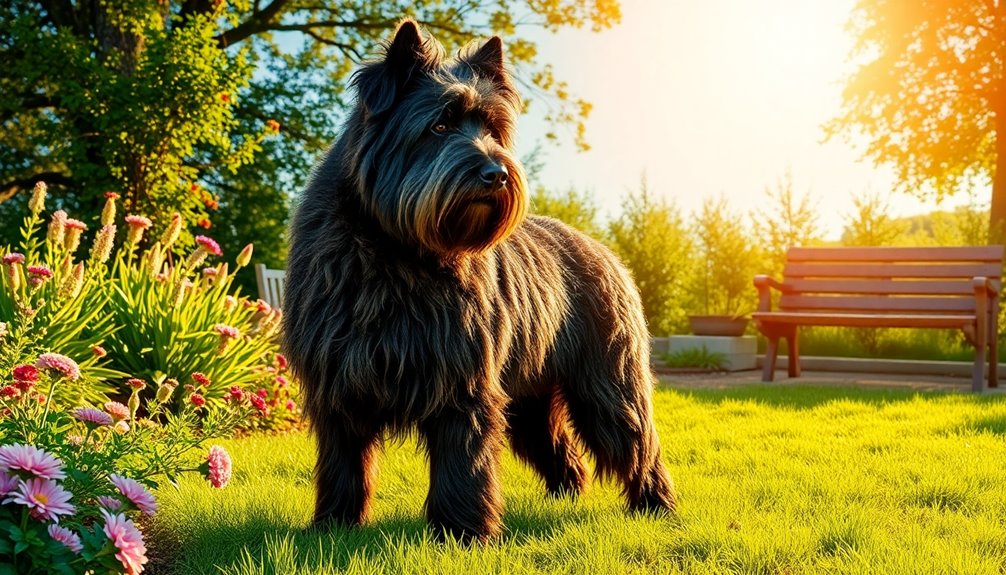
If you're considering a Bouvier Des Flandres, you'll want a spacious home with a secure yard where they can roam and play freely. These dogs thrive in cooler climates, so keep that in mind when choosing your environment. A rural or suburban setting is often ideal, as it provides plenty of room for their energetic nature. Additionally, they require at least 2 hours of daily exercise to keep them physically and mentally stimulated.
Spacious Home With Secure Yard
Providing a spacious home with a secure yard is essential for a Bouvier Des Flandres, as these dogs thrive in environments that allow for ample movement and activity. They need room to run and exercise, requiring at least one to two hours of vigorous activity daily. A fenced yard is a must to keep your dog safe and prevent escape, ensuring they've a secure area to play and explore.
While Bouviers can adapt to apartment living, it's crucial to meet their exercise needs. A cramped space isn't suitable for their high energy levels; they benefit greatly from outings to parks or open areas. Ideally, you'll want a home in a country or suburban setting where they can engage actively with their environment. Additionally, their strong herding instincts mean they tend to stay close to home, making a secure yard even more important.
Your yard should be large enough to accommodate their playful nature and allow them to patrol and enjoy their surroundings. Providing a spacious home with a secure yard not only keeps your Bouvier happy but also helps prevent behavioral issues that can arise from boredom or lack of exercise.
With the right environment, you'll foster a strong bond with your gentle protector.
Prefers Cooler Climates Overall
Bouvier des Flandres thrive best in cooler climates, thanks to their dense double coat that insulates them against the cold. This breed is well-equipped to handle chilly conditions, allowing them to enjoy outdoor winter activities without discomfort.
Their coat consists of a rough, coarse outer layer and a softer undercoat, providing excellent protection in cold and wet environments. Historically, these dogs served as farm workers in Flanders, further adapting them to cooler climates.
However, in hot weather, their thick coat can be a disadvantage. You'll need to ensure they've a cool, shaded place to retreat during peak summer months. Schedule exercise for the cooler parts of the day to prevent heat stress, and monitor them closely to avoid overheating.
Regular grooming is essential to keep their coat healthy and free of dirt and tangles. Weekly brushing helps remove loose hairs and distribute natural oils, ensuring their coat remains shiny.
While they prefer cooler climates, with proper care, Bouvier des Flandres can adapt to various living conditions, provided their exercise and mental stimulation needs are met. Their intelligence and loyalty make them versatile companions, even in warmer environments.
Rarely Barks, Communicates Differently
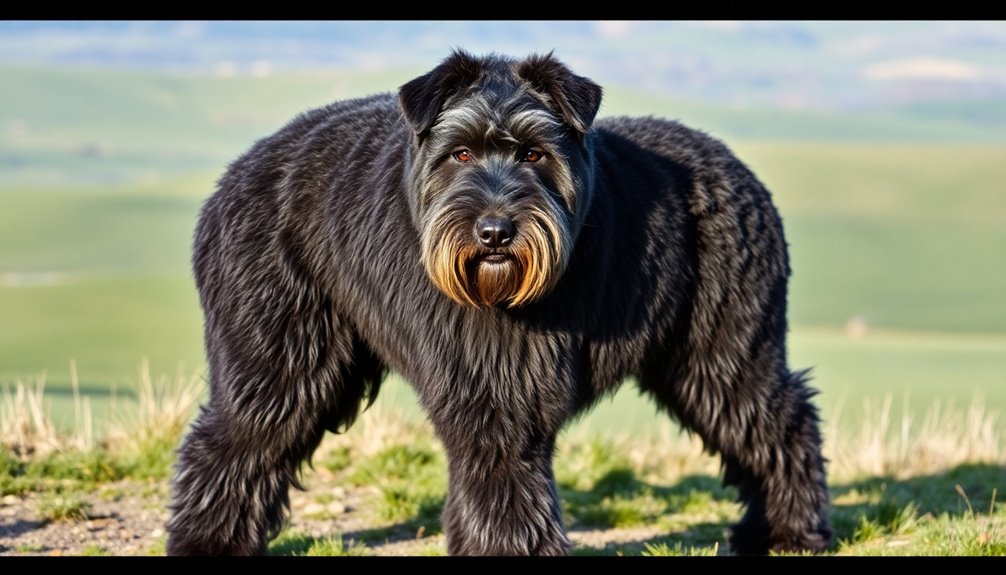
You might notice that Bouvier Des Flandres rarely barks, but they still have a strong herding instinct that shines through in their behavior. This unique communication style often includes body language and attentive gazes, making them effective protectors without excessive vocalization. Their presence has even captured hearts in Belgian films, showcasing their versatility and charm. With their intelligent and loyal nature, they form strong bonds with their families, making them both guardians and companions.
Strong Herding Instinct Remains
With their strong herding instincts, Bouviers excel at guiding livestock with grace and confidence. As primarily drovers, they move stock ahead of you, keeping everything together while using their bulk and strength to redirect straying animals without nipping at their heels.
Their preferred style involves maintaining close proximity to the livestock, but training is essential to ensure they do so without causing distress. Understanding herding instincts is crucial to effectively manage the behaviors exhibited by Bouviers during training sessions.
These dogs possess a natural protective instinct, honed through their herding origins. They remain watchful and alert, evaluating strangers before determining if there's a threat. This makes consistent socialization crucial, helping them distinguish between friendly visitors and potential dangers.
While Bouviers can bark, they primarily communicate through body language. You'll notice their upright posture and self-assuredness, which convey power and control. They can anticipate movement, using techniques like 'heading off' to manage their charges effectively.
Training and socialization from a young age are vital. Bouviers respond well to positive reinforcement, making it easier to teach them recall and other commands.
Their strong herding instincts, combined with proper training, ensure they remain the gentle protectors of your family and livestock.
Featured in Belgian Films
Although often overlooked in popular cinema, the Bouvier des Flandres has made a memorable impact in Belgian films, particularly in "A Dog of Flanders." This 1999 adaptation of Ouida's classic novel features a Bouvier named Patrasche, who embodies loyalty and companionship, showcasing the breed's gentle and protective nature.
In the film, Patrasche is central to the story, found beaten and nursed back to health by Nello and Jehaan. As Nello's constant companion, Patrasche inspires his art while symbolizing unwavering loyalty. Their bond is deeply emotional, highlighting how Patrasche senses and responds to Nello's feelings and needs, reinforcing his role during challenging times. The film also illustrates the theme of social injustice, as Nello faces obstacles imposed by a cruel landlord.
What's striking about Patrasche is his communication style. Instead of barking, he expresses himself through actions and body language, reflecting the breed's gentle disposition.
His interactions with Nello and other characters, like Aloise and Michel La Grande, emphasize the strong emotional connections without excessive vocalizations. This nuanced portrayal in "A Dog of Flanders" beautifully captures the Bouvier des Flandres' essence, making it a poignant representation of the breed's character in Belgian cinema.
Ideal for Active Lifestyles?
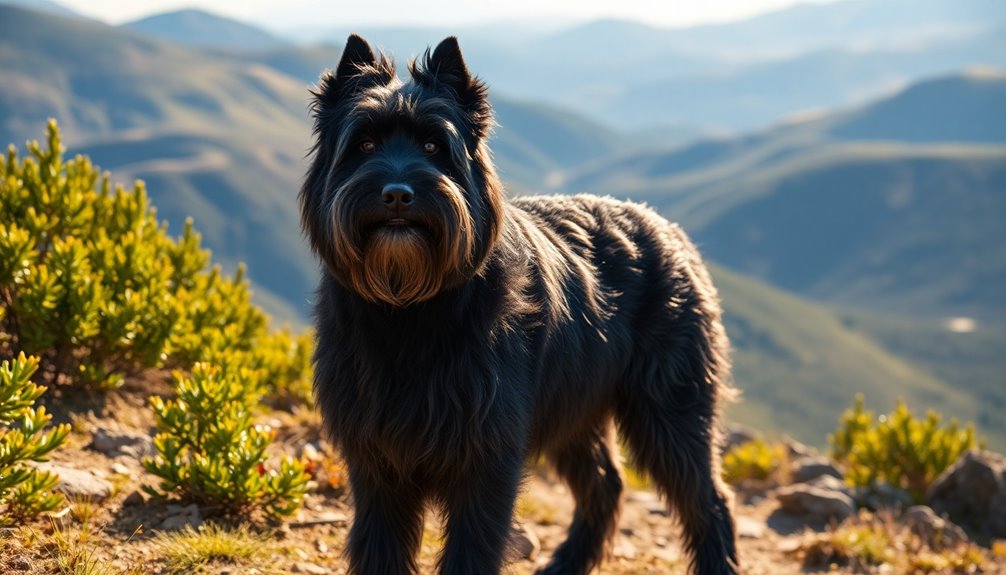
If you love outdoor activities, the Bouvier Des Flandres is a fantastic companion that thrives on adventure and exercise. Their moderate to high energy level makes them ideal for families who enjoy an active lifestyle. However, be prepared for demanding grooming needs, as their thick coat requires regular maintenance to keep it healthy. Regular grooming helps prevent potential health issues related to their coat, ensuring a happy and healthy relationship with your furry friend. Balancing their active lifestyle with proper grooming will ensure a happy and healthy relationship with your furry friend.
Great for Outdoor Enthusiasts
The Bouvier Des Flandres is a perfect companion for outdoor enthusiasts who lead active lifestyles. With a need for at least 1.5 to 2 hours of exercise daily, this breed thrives on long walks, jogging, and interactive games like fetch.
You'll find that engaging in outdoor activities such as hiking or running is a delightful way to bond with your Bouvier while keeping both of you fit. Their natural strength and endurance make them suitable for weight pulling and carting, offering you unique ways to challenge them physically. Additionally, their strong herding abilities can make them exceptional companions during outdoor gatherings when you need assistance managing large groups.
However, it's not just about physical exercise; mental stimulation is crucial too. Incorporating training sessions and puzzle toys can keep their sharp minds engaged, preventing boredom and behavioral issues.
The Bouvier adapts well to different living situations, including apartments, as long as you commit to regular outings in parks or open spaces. They'll thrive on companionship and should be included in family activities.
From agility exercises to water activities like swimming, you'll discover that this breed loves to participate in various dog sports and performance events, making them an ideal partner for your outdoor adventures.
Grooming Needs Can Be Demanding
Grooming a Bouvier Des Flandres can be demanding, requiring commitment to maintain their distinctive coat and overall health. You'll need to brush your dog weekly to remove dead hair and prevent matting, dedicating about an hour or less each week for thorough grooming. It's crucial to start at the head and work your way to the rear, ensuring the coat separates to the skin. Every 4-6 weeks, a more in-depth grooming session is necessary to keep their coat and skin healthy. During seasonal transitions, like spring and fall, you'll need to increase your grooming frequency to manage the shedding undercoat.
Using stiff bristle or pin brushes will help you effectively tackle their rough double coat. Regular exercise is essential for a Bouvier des Flandres to maintain their physical health and mental stimulation, so consider incorporating playtime into your grooming routine. Additionally, a consistent cleaning schedule can help manage the pet hair that accumulates in your home. Watch for common grooming challenges, such as hot spots in the summer or matted puppy fluff, which can lead to a total shave down if neglected. Regular ear cleaning and paw care are also essential to prevent issues.
With the right tools and techniques, you can keep your Bouvier looking sharp and feeling great, fitting seamlessly into your active lifestyle.
Frequently Asked Questions
What Is the Average Weight of a Bouvier Des Flandres?
The average weight of a Bouvier des Flandres varies by sex. Males typically weigh between 80 and 120 pounds, while females range from 60 to 80 pounds.
At three months, you can expect males to be 40-50 pounds and females 35-45 pounds. By one year, males often weigh 95-110 pounds and females 80-90 pounds.
It's important to monitor their diet and exercise to maintain a healthy weight throughout their life.
Do Bouvier Des Flandres Get Along With Children?
Yes, Bouvier des Flandres generally get along well with children.
They're patient, gentle, and eager to please, making them great companions for families.
However, since they're large and strong, supervision is essential during interactions with younger kids.
Early socialization and consistent training help ensure positive behavior.
With the right environment and proper guidance, you'll find these dogs can be playful protectors, creating a harmonious relationship with your children.
How Often Should I Groom My Bouvier Des Flandres?
You should groom your Bouvier des Flandres at least once or twice a week to keep their coat healthy and manageable.
Regular brushing helps prevent mats and removes loose hair, especially during shedding seasons when you may need to brush more frequently.
Bathing should only happen a few times a year or when they get dirty.
Don't forget to clean their ears and trim their nails every few weeks for overall care.
Are Bouvier Des Flandres Prone to Any Specific Diseases?
Yes, Bouvier des Flandres are prone to specific diseases. You should be aware of genetic disorders like cataracts, glaucoma, and laryngeal paralysis.
They can also face musculoskeletal issues such as hip and elbow dysplasia. Additionally, allergies and infections are common, alongside dental disease.
Regular veterinary check-ups can help catch these problems early, ensuring your dog stays healthy and happy. Staying informed will aid in preventing or managing these conditions effectively.
What Types of Toys Do Bouvier Des Flandres Prefer?
When choosing toys for your dog, consider their preferences for safe and durable options.
They'll likely enjoy soft and plush toys for cuddling, while interactive toys can stimulate their minds.
Natural chews are great for satisfying their chewing instincts without harmful ingredients.
Rotate the toys regularly to keep them fresh and exciting, and make sure to monitor soft toys to prevent destruction.
Your pup's happiness depends on having a variety of engaging toys!
Conclusion
In conclusion, the Bouvier des Flandres is an exceptional companion for those who appreciate a gentle yet protective dog. With their unique blend of strength and loyalty, they thrive in active households and make excellent family pets. Their low barking tendency means they communicate in their own special way, fostering a strong bond with you. If you're ready for a devoted friend who's eager to join you on adventures, the Bouvier des Flandres might just be your perfect match.

